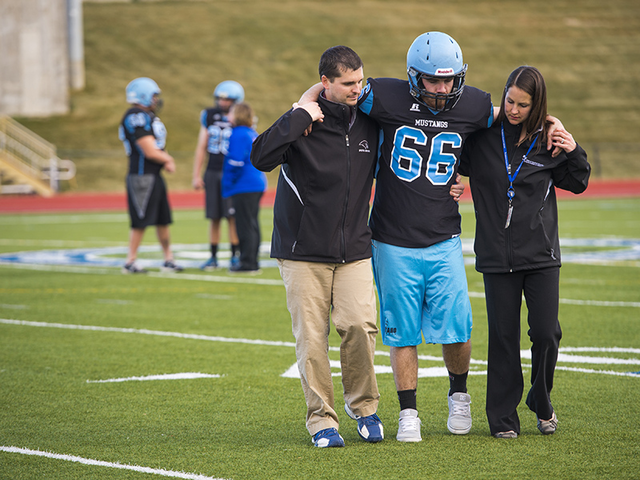A sports medicine physician specializes in treating and preventing injuries related to sports and physical activity. They provide medical care, rehabilitation, and personalized treatment plans for athletes and active individuals.
With their knowledge in both medicine and sports science, these physicians play a vital role in optimizing performance and minimizing the risk of injuries in athletes of all levels. Sports medicine encompasses a multidisciplinary approach to enhance the performance, health, and well-being of individuals involved in physical activity and sports.
At the forefront of this field are sports medicine physicians, who possess specialized expertise in diagnosing, treating, and preventing injuries associated with sports. These physicians combine their medical training with a comprehensive understanding of sports science to address the unique demands and challenges faced by athletes and active individuals. From professional athletes to recreational enthusiasts, sports medicine physicians play a critical role in optimizing performance, promoting healing, and cultivating long-term athletic excellence. We will explore the essential responsibilities and qualifications of sports medicine physicians, as well as their contributions to the world of sports and physical activity.

Education And Training
Welcome to our blog post series about Sports Medicine Physician! In this section, we will be discussing the extensive Education and Training required to become a Sports Medicine Physician. This field requires a strong foundation in both medicine and sports science, ensuring that these professionals are equipped with the knowledge and skills necessary to treat and prevent injuries in athletes of all levels.
Medical Degree And Residency
The journey to becoming a Sports Medicine Physician starts with obtaining a Medical degree, typically a Doctor of Medicine (MD) or Doctor of Osteopathic Medicine (DO). This rigorous program provides students with a comprehensive understanding of the human body, diagnosis, treatment, and other core medical subjects.
Following the completion of medical school, aspiring Sports Medicine Physicians must complete a residency program specializing in family medicine, internal medicine, emergency medicine, or physical medicine and rehabilitation. These residency programs provide intensive hands-on training in a clinical setting, allowing physicians to develop the necessary skills in diagnosis, treatment, and patient care. During this period, they gain invaluable experience working with patients and tackling a wide range of medical issues.
Fellowship In Sports Medicine
After completing residency, Sports Medicine Physicians are required to pursue a fellowship in sports medicine. This additional training offers specialized knowledge in diagnosing and managing sports-related injuries and conditions.
The duration of a sports medicine fellowship typically ranges from one to two years. During this time, physicians work closely with experienced sports medicine professionals, gaining exposure to various athletic populations, including professional athletes, collegiate athletes, and recreational sports enthusiasts. This hands-on experience allows them to develop skills in managing acute injuries, dealing with chronic conditions, and designing individualized treatment plans tailored to athletes’ specific needs.
Additional Certifications And Credentials
To further enhance their expertise and credibility, Sports Medicine Physicians often acquire additional certifications and credentials. These certifications serve as a testament to their dedication to ongoing professional development and staying at the forefront of the field.
One such certification is the Certificate of Added Qualification in Sports Medicine (CAQSM). This certification is awarded by the American Board of Family Medicine and demonstrates a physician’s advanced knowledge and competency in sports medicine. Additionally, physicians may obtain certifications such as the Board Certification in Sports Medicine from the American Board of Internal Medicine or the Primary Care Sports Medicine certification from the American Osteopathic Association.
These certifications and credentials not only validate a Sports Medicine Physician’s skills but also provide reassurance to patients seeking specialized care for their sports-related injuries.

Scope Of Practice
When it comes to the field of sports medicine, the scope of practice for a sports medicine physician is diverse and extensive. These highly specialized doctors play a crucial role in the care of athletes and individuals engaged in sports and physical activities. With a deep understanding of both the medical and sports aspects, sports medicine physicians provide comprehensive and tailored care to their patients. Let’s explore the different areas in which sports medicine physicians excel:
Diagnosing And Treating Sports-related Injuries
Sports medicine physicians are experts in diagnosing and treating a wide range of sports-related injuries. From common ailments like sprains, strains, and fractures to more complex conditions such as ligament tears and concussions, these physicians utilize their in-depth knowledge and diagnostic skills to identify the root cause of the injury and develop effective treatment plans. Whether it involves prescribing medication, recommending physical therapy, or performing minimally invasive procedures, sports medicine physicians ensure that athletes receive the best possible care to get back in the game.
Preventive Care And Injury Prevention
Prevention is always better than cure, and sports medicine physicians understand the importance of proactive measures to prevent injuries. They work closely with athletes to design training programs that focus on proper technique, injury prevention exercises, and physical conditioning. By assessing potential risk factors and addressing them early on, sports medicine physicians help athletes stay at the top of their game while minimizing the risk of injury. Regular check-ups, screenings, and education on injury prevention techniques are all part of their comprehensive approach.
Performance Enhancement And Sports Psychology
Sports medicine physicians not only address the physical aspects of sports but also recognize the importance of mental well-being in athletic performance. They collaborate with sports psychologists to provide guidance on goal setting, stress management, and performance enhancement strategies. By understanding the psychological and emotional factors that can impact an athlete’s performance, sports medicine physicians are able to provide a holistic approach to support their patients in achieving their optimal athletic potential.
Nutrition And Sports-specific Diet Planning
Nutrition plays a vital role in an athlete’s performance and recovery. Sports medicine physicians are well-versed in sports-specific diet planning, taking into consideration an athlete’s unique nutritional requirements and goals. They develop personalized nutrition plans to optimize energy levels, enhance muscle recovery, and promote overall health. By educating athletes on proper nutrition and the importance of fueling their bodies, sports medicine physicians empower them to make informed dietary choices that contribute to their performance and well-being.
Rehabilitation And Physical Therapy
When injuries do occur, sports medicine physicians are at the forefront of rehabilitation and physical therapy. These professionals create tailored rehabilitation programs that focus on restoring strength, flexibility, and functionality. Whether it involves post-surgical rehabilitation, injury-specific exercises, or the use of cutting-edge therapies, sports medicine physicians ensure that athletes receive comprehensive care to aid in their recovery. By closely monitoring progress and making necessary adjustments, they guide athletes through each step of their rehabilitation journey.
Working With Athletes
When it comes to sports medicine physicians, one of their primary roles is working closely with athletes. These medical professionals are skilled in diagnosing and treating a wide range of sports-related injuries and helping athletes optimize their performance. Let’s explore the various aspects of their work in more detail.
Collaboration With Coaches And Trainers
Sports medicine physicians understand the importance of collaboration when it comes to supporting athletes. They work closely with coaches and trainers to develop comprehensive training programs and injury prevention strategies. By effectively communicating and sharing their expertise, they can help athletes enhance their performance while minimizing the risk of injury.
Injury Management And Return-to-play Decisions
In the event of an injury, sports medicine physicians play a critical role in managing and treating the athlete. They provide specialized care and create a personalized rehabilitation plan tailored to the specific injury and athlete’s needs. These physicians have the expertise to make informed return-to-play decisions, ensuring that athletes resume their activities safely and at the appropriate time.
Sports-specific Considerations
Sports medicine physicians understand that different sports require unique considerations. They are well-versed in the specific demands and physical requirements of various sports, enabling them to provide targeted guidance and treatment. Whether it’s understanding the repetitive stress injuries common in runners or the impact of contact in team sports, these physicians take into account the specific challenges each athlete faces.
Serving As Team Physicians
Many sports medicine physicians serve as team physicians, providing medical care both on and off the field. They attend practices, games, and competitions, ensuring the athletes receive immediate attention if an injury occurs. Team physicians play a vital role in maintaining the overall health and well-being of the athletes, contributing to their long-term success and longevity in their respective sports.
In conclusion, sports medicine physicians are instrumental in working with athletes to optimize their performance, manage injuries, and facilitate safe return-to-play decisions. Their collaboration with coaches and trainers, consideration of sports-specific factors, and role as team physicians make them crucial members of the sports community.

Research And Advancements
When it comes to sports medicine, research and advancements play a pivotal role in improving the diagnosis, treatment, and prevention of sports-related injuries. Sports medicine physicians are at the forefront of this field, constantly seeking new knowledge and innovative approaches to deliver the best possible care to athletes of all levels. Let’s take a closer look at the contributions, involvement in clinical trials and studies, and adoption of innovative technologies and treatments by these physicians.
Contributions To Sports Medicine Research
Sports medicine physicians are actively involved in various research projects and studies aimed at gaining a deeper understanding of sports-related injuries and their management. Their contributions have significantly enhanced our knowledge of biomechanics, injury prevention, and the impact of exercise on the human body.
Key research areas include:
- Exploring the efficacy of different rehabilitation techniques for specific injuries.
- Investigating the long-term effects of recurring injuries on athletes’ performance and overall health.
- Studying the psychological impact of sports injuries and developing strategies to support athletes during recovery.
Involvement In Clinical Trials And Studies
Sports medicine physicians not only contribute to research but also actively participate in clinical trials and studies. Through these trials, they can evaluate the effectiveness of new treatments, therapies, and preventive measures for sports-related injuries.
Examples of their involvement include:
- Participating in trials to test new surgical techniques for ligament reconstructions, joint replacements, and other sports-related surgeries.
- Collaborating with researchers to study the impact of certain medications or supplements on athletic performance and injury prevention.
- Conducting studies on the use of regenerative medicine, such as platelet-rich plasma (PRP) therapy, to accelerate healing and improve outcomes.
Adoption Of Innovative Technologies And Treatments
Sports medicine physicians are dedicated to staying up-to-date with the latest advancements and technologies in their field. By embracing innovative technologies and treatments, they aim to provide athletes with cutting-edge care, improving recovery times and overall outcomes.
Some examples of these advancements include:
- Utilizing motion analysis systems to assess an athlete’s biomechanics and detect any abnormalities or imbalances contributing to injuries.
- Incorporating telemedicine and remote monitoring tools to provide virtual consultations and monitor athletes’ progress, especially during times where in-person visits may be challenging.
- Integrating regenerative therapies like stem cell injections into treatment plans, harnessing the body’s natural healing potential.
In conclusion, sports medicine physicians are actively involved in research, clinical trials, and the adoption of innovative technologies and treatments. Their commitment to advancing the field of sports medicine ensures that athletes receive the highest quality care, maximizing their performance and minimizing the risk of injuries.
Frequently Asked Questions For Sports Medicine Physician
What Is The Difference Between Sports Medicine Physician And Doctor?
Sports medicine physicians specialize in the treatment of injuries and conditions related to sports and physical activity. They have additional training in sports-related injuries. A doctor, on the other hand, is a general term for physicians who treat various medical conditions.
What Is The Best Major For A Sports Medicine Physician?
The best major for a sports medicine physician is typically a Bachelor’s degree in either pre-med or exercise science, followed by completing medical school and a residency program in sports medicine. This provides a strong foundation in both medical knowledge and athletic training.
What Is The Primary Role Of A Sports Physician?
A sports physician’s main role is to diagnose and treat athletic injuries, provide rehabilitation plans, and offer advice on injury prevention and performance enhancement. They play a crucial role in helping athletes recover and achieve optimal physical health and performance.
What Do Sports Medicine Doctors Study?
Sports medicine doctors study various aspects of healthcare related to sports and exercise. They focus on preventing, diagnosing, and treating injuries and conditions that affect athletes and active individuals. This includes studying anatomy, physiology, musculoskeletal injuries, exercise physiology, nutrition, and rehabilitation techniques.
Conclusion
Sports medicine physicians play a vital role in the optimal performance and well-being of athletes. Through their specialized training and expertise, they provide comprehensive care and treatment for sports-related injuries and conditions. By understanding the unique demands of each sport and athlete, these physicians are able to deliver personalized care, ensuring a safe and successful return to activity.
With their knowledge and dedication, sports medicine physicians contribute significantly to the field of sports medicine and help athletes achieve their full potential.



